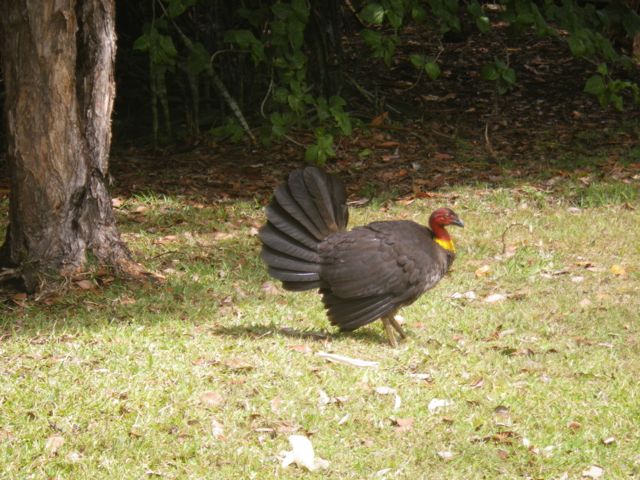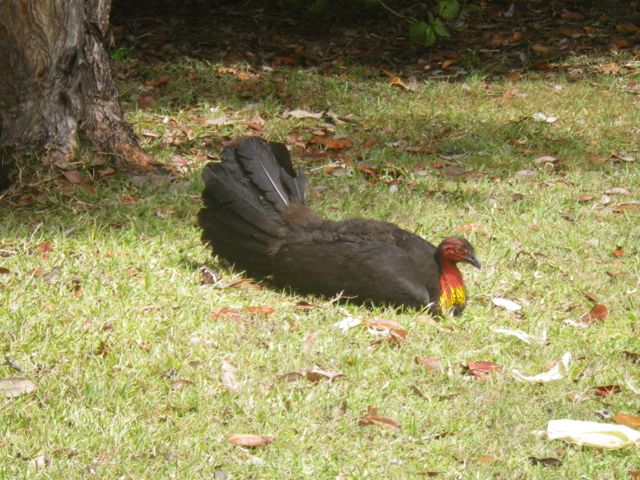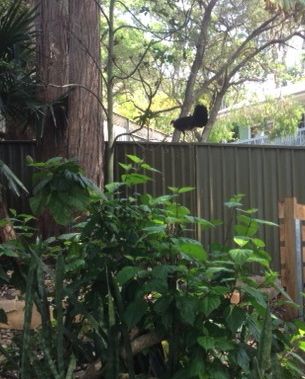A week or two before we came up to Wamberal to reconnect with our newly inherited cottage by the sea, we participated in a workshop run by the North Sydney council on Australian Brush Turkeys. These birds have, over the last decades, reinhabited the areas of NSW they had disappeared from due to foxes and other feral predators. Although many people in Sydney and the Central Coast are now frustrated by their neighbourhood brush turkeys because of their instinctive raking and mound building behaviours, the workshop focused on their interesting biology and life cycle. We even borrowed a little book by the workshop leader, Ann Göth, to follow up.
We had not an inkling that we were about to discover our “own” resident brush turkey with its large mound underneath the huge hibiscus in our new back yard. We “named” him BT, or Bertie, and I was pleasantly reminded of my dad, Albert, who enjoying playing with the baby magpies in this same back yard when I was a child.
We had not an inkling that we were about to discover our “own” resident brush turkey with its large mound underneath the huge hibiscus in our new back yard. We “named” him BT, or Bertie, and I was pleasantly reminded of my dad, Albert, who enjoying playing with the baby magpies in this same back yard when I was a child.
Over the last year we have been both fascinated to watch BT from our back porch, and frustrated by his destructive raking bare of the grass in the yard. There seems to be an extended brush turkey family roosting in the trees in the neighbouring property behind ours. When our landscaper dismantled BTs mound, (and heavily pruned the overarching hibiscus (!!) - the subject of my last blog), I felt the loss but appreciated the inevitability of reclaiming our back yard jungle. My partner Alex was pleased with this increased spaciousness because it offered us potential for our new garden, but I noticed pangs of guilt when observing BT continue to try to rake leaves despite nowhere to put them. Lately, it seems that he managed to build up a mound just over our back fence.
Then, a few days ago, I learned from Alex that our next door neighbours, whose back garden BT had apparently destroyed with his raking, had trapped him and “relocated” him two hours drive away. I was horrified! I am still grieving. I cannot imagine how people can be so unempathetic that they could take BT out of his family group, far away from his landscape and abandon him in a place he has no familiarity with, no knowledge of local resources of water, food, or predators and other dangers like traffic. I am so, so sad that “my” BT, who was almost a “pet”, has been kidnapped without any word to me, his fate just communicated to my partner as an aside during an across-the-fence conversation.
Then, a few days ago, I learned from Alex that our next door neighbours, whose back garden BT had apparently destroyed with his raking, had trapped him and “relocated” him two hours drive away. I was horrified! I am still grieving. I cannot imagine how people can be so unempathetic that they could take BT out of his family group, far away from his landscape and abandon him in a place he has no familiarity with, no knowledge of local resources of water, food, or predators and other dangers like traffic. I am so, so sad that “my” BT, who was almost a “pet”, has been kidnapped without any word to me, his fate just communicated to my partner as an aside during an across-the-fence conversation.
Over the days, my grief has deepened and broadened, causing me to contemplate all the animals which have similarly been stolen from their family groups, by poachers, for zoos, or as a result of the destruction and theft of their habitat.
And of course in the human world, the barbaric practice of stealing indigenous children from their parents “for their own good” still continues, as well as the theft of land and cultural appropriation.
I wonder about the big picture. The failure to empathise with beings other than one’s immediate group seems to be common across social animals such as chimps and humans. “Us” and “them” is perhaps a natural response to resource scarcity and selfish genes. Evolutionary advantages in sharing and caring are inversely proportional to genetic relatedness. So why am I so surprised at my neighbours’ treatment of brush turkeys, which are after all a species more closely related to poultry, (considered “food”), than to us “intelligent” humans?
Are we just obeying the imperatives of the evolutionary process when we steal, plunder, take whatever we want from the environment? After all, predators would not ask us before munching on our limbs for their lunch. “Theft” is built in to the cycles of eating and decaying – everything takes what it needs without compunction. The emergence of empathy for other species seems to be a developmental and cultural latecomer – we have not even been able to be kind to all other humans yet, so maybe I am asking too much of our species to expect universal ecological identity? The mess we have created of our world speaks volumes. We are currently still hell-bent on stealing the future from our children and the entire biosphere. Unless we learn empathy rapidly our fate looks bleak.
Poor BT has been taken to a fate I will never know. Maybe he has already died of thirst or hunger, or been run over by a car as he tried to come back to his birthplace – a thousand imagined horrors are possible. Or maybe this is his new adventure – maybe he, as a “foreigner” will attract lots more females, maybe he will continue to father baby BTs in his strange new land for some time…
I do miss him. But one of his relatives seems to have already filled the vacuum in our back yard that his kidnapping left. Or maybe…just maybe...they got the wrong BT?
And of course in the human world, the barbaric practice of stealing indigenous children from their parents “for their own good” still continues, as well as the theft of land and cultural appropriation.
I wonder about the big picture. The failure to empathise with beings other than one’s immediate group seems to be common across social animals such as chimps and humans. “Us” and “them” is perhaps a natural response to resource scarcity and selfish genes. Evolutionary advantages in sharing and caring are inversely proportional to genetic relatedness. So why am I so surprised at my neighbours’ treatment of brush turkeys, which are after all a species more closely related to poultry, (considered “food”), than to us “intelligent” humans?
Are we just obeying the imperatives of the evolutionary process when we steal, plunder, take whatever we want from the environment? After all, predators would not ask us before munching on our limbs for their lunch. “Theft” is built in to the cycles of eating and decaying – everything takes what it needs without compunction. The emergence of empathy for other species seems to be a developmental and cultural latecomer – we have not even been able to be kind to all other humans yet, so maybe I am asking too much of our species to expect universal ecological identity? The mess we have created of our world speaks volumes. We are currently still hell-bent on stealing the future from our children and the entire biosphere. Unless we learn empathy rapidly our fate looks bleak.
Poor BT has been taken to a fate I will never know. Maybe he has already died of thirst or hunger, or been run over by a car as he tried to come back to his birthplace – a thousand imagined horrors are possible. Or maybe this is his new adventure – maybe he, as a “foreigner” will attract lots more females, maybe he will continue to father baby BTs in his strange new land for some time…
I do miss him. But one of his relatives seems to have already filled the vacuum in our back yard that his kidnapping left. Or maybe…just maybe...they got the wrong BT?



 RSS Feed
RSS Feed